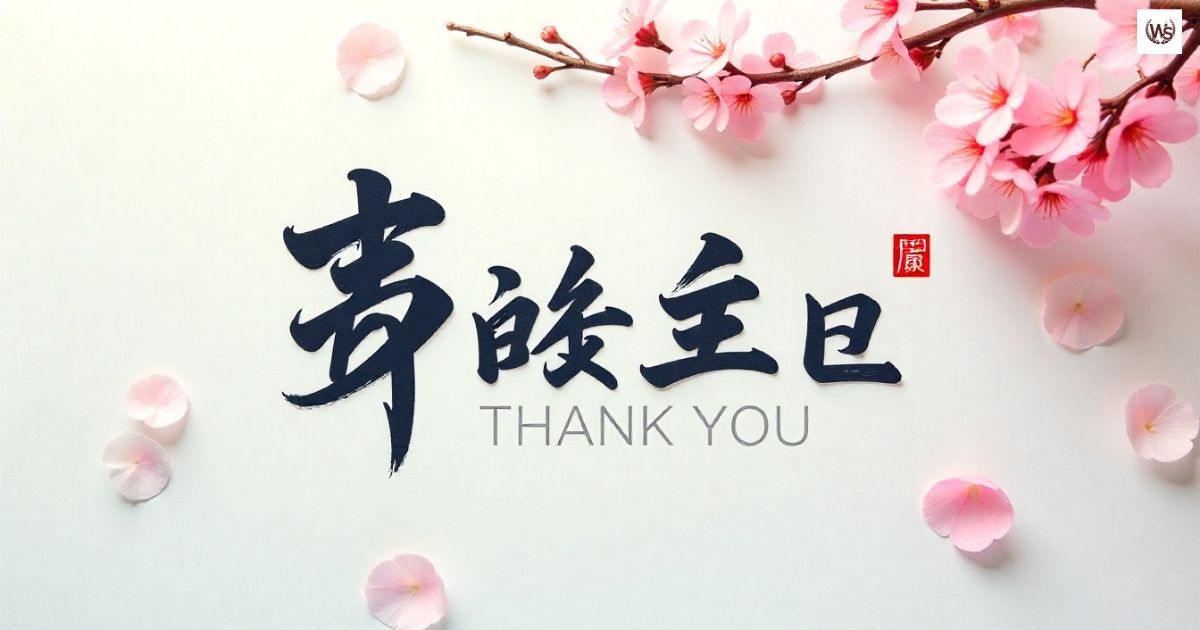Expressing gratitude in Japanese is more than just saying a few words, it reflects respect, culture, and the bonds between people. Whether you’re visiting Japan or learning the language, knowing how to say thank you in Japanese the right way is important. It helps you connect and show genuine sincerity in many situations.
This blog post will clear up any confusion by sharing simple, useful ways to say thank you in Japanese for every occasion. Whether you’re talking with friends, attending a business meeting, or thanking someone for a meal, you’ll find the perfect phrase to sound natural and respectful.
How to Say Thank You in Japanese in Every Situation
Japanese have many ways to say thank you depending on the situation. The phrase you choose depends on who you’re talking to and how formal or casual the setting is. For example, you might use a simple “arigatou” with close friends but opt for a more formal phrase at work or with strangers.
Besides words, gestures like bowing often accompany expressions of gratitude in Japan. The deeper and longer the bow, the more respect and sincerity you show. Understanding these differences helps you express thanks appropriately in every situation.
- Arigatou (ありがとう) – Casual, for friends and family
- Arigatou gozaimasu (ありがとうございます) – Polite, everyday use
- Domo arigatou (どうもありがとう) – Casual, heartfelt thanks
- Domo arigatou gozaimasu (どうもありがとうございます) – Very polite, formal
- Arigatou gozaimashita (ありがとうございました) – Past tense, after a favor or service
- Sumimasen (すみません) – Thanks combined with apology
- Kansha shimasu (感謝します) – Formal gratitude expression
- Osewa ni narimashita (お世話になりました) – Thanks for care or support
- Hontou ni arigatou (本当にありがとう) – Truly, thank you
- Okage-sama de (おかげさまで) – Thanks for your support
- Doumo (どうも) – Very casual thanks or greeting
- Shitsurei shimasu (失礼します) – Polite phrase when leaving or excusing oneself
12 Ways to Say Thank You in Japanese
There are many phrases you can use to say thank you in Japanese, each with its own nuance and level of politeness. Knowing these variations will help you pick the right one based on your relationship and the setting.
Some expressions are perfect for casual chats with friends, while others suit formal occasions or business meetings. Mastering these will make your Japanese sound natural and respectful.
- Arigatou (ありがとう) – Casual and friendly
- Arigatou gozaimasu (ありがとうございます) – Polite and common
- Domo arigatou (どうもありがとう) – Slightly more emotional
- Domo arigatou gozaimasu (どうもありがとうございます) – Very polite and respectful
- Arigatou gozaimashita (ありがとうございました) – After the fact, polite
- Sumimasen (すみません) – Thank you plus apology for inconvenience
- Kansha shimasu (感謝します) – Formal gratitude
- Osewa ni narimashita (お世話になりました) – Thanks for your help or care
- Hontou ni arigatou (本当にありがとう) – Truly grateful
- Okage-sama de (おかげさまで) – Thanks to you (common response)
- Doumo (どうも) – Casual, can mean thanks or hi
- Shitsurei shimasu (失礼します) – Polite phrase, sometimes a thank you when leaving
Japanese Gratitude Guide
In Japan, saying thank you goes far beyond polite words; it reflects a deep cultural value of respect and humility. Expressing gratitude properly means understanding the social context and the relationship between people.
Bowing is a common gesture that accompanies thanks and conveys sincerity. The way you bow shows your level of respect. Using the right phrase together with proper body language is key to expressing true gratitude in Japanese culture.
- Arigatou (ありがとう) – Basic thanks
- Arigatou gozaimasu (ありがとうございます) – Polite thanks
- Domo arigatou (どうもありがとう) – More heartfelt thanks
- Domo arigatou gozaimasu (どうもありがとうございます) – Formal gratitude
- Arigatou gozaimashita (ありがとうございました) – After service thanks
- Sumimasen (すみません) – Thank you/apology mix
- Kansha shimasu (感謝します) – Formal appreciation
- Osewa ni narimashita (お世話になりました) – Thank you for your support
- Hontou ni arigatou (本当にありがとう) – Truly thankful
- Okage-sama de (おかげさまで) – Thanks for your help
- Doumo (どうも) – Casual thanks
- Shitsurei shimasu (失礼します) – Polite excuse or thanks
The Perfect Way to Say Thank You in Japanese
Choosing the perfect way to say thank you depends on your relationship and the occasion. For business or formal settings, polite expressions like “arigatou gozaimasu” are best. In casual conversations, a simple “arigatou” works well.
Your tone and body language also matter. A sincere bow combined with the right phrase shows your appreciation clearly. Matching your words to the situation will help you express gratitude naturally and respectfully.
- Arigatou (ありがとう) – Casual
- Arigatou gozaimasu (ありがとうございます) – Polite
- Domo arigatou (どうもありがとう) – Casual and warm
- Domo arigatou gozaimasu (どうもありがとうございます) – Very polite
- Arigatou gozaimashita (ありがとうございました) – After an action
- Sumimasen (すみません) – Thank you/apology
- Kansha shimasu (感謝します) – Formal thanks
- Osewa ni narimashita (お世話になりました) – Thank you for support
- Hontou ni arigatou (本当にありがとう) – Truly grateful
- Okage-sama de (おかげさまで) – Thanks to you
- Doumo (どうも) – Casual thanks
- Shitsurei shimasu (失礼します) – Polite excuse/thanks
Thank You in Japanese Formal
Formal Japanese thank-you phrases are crucial in business and polite society. Use “arigatou gozaimasu” or “domo arigatou gozaimasu” when addressing superiors or clients. These show respect and proper etiquette.
Adding humble language like “osore irimasu” increases politeness. For example, “Osore irimasu ga, arigatou gozaimasu” expresses deep humility along with thanks, which is highly valued in Japanese formal communication.
- Arigatou gozaimasu (ありがとうございます)
- Domo arigatou gozaimasu (どうもありがとうございます)
- Arigatou gozaimashita (ありがとうございました)
- Osore irimasu (恐れ入ります) – Humble expression
- Osewa ni natte orimasu (お世話になっております) – Thank you for ongoing support
- Hontou ni kansha shimasu (本当に感謝します) – Deep thanks
- Kansha itashimasu (感謝いたします) – Very formal gratitude
- Makoto ni arigatou gozaimasu (誠にありがとうございます) – Sincere thanks
- Shitsurei itashimasu (失礼いたします) – Polite excuse/thanks
- Okage-sama de arigatou gozaimasu (おかげさまでありがとうございます)
- Doumo osewa ni natte orimasu (どうもお世話になっております)
- Doumo osore irimasu (どうも恐れ入ります)
Informal Thank You in Japanese
With friends or family, informal thank-you phrases are perfect. Simple “arigatou” or just “doumo” works well and feels warm and natural. Sometimes slang or playful expressions appear in casual conversations.
Be careful not to overuse formal phrases in informal contexts they can sound awkward. Matching the casual tone of your conversation helps maintain good relationships.
- Arigatou (ありがとう)
- Doumo (どうも)
- Domo arigatou (どうもありがとう)
- Hontou ni arigatou (本当にありがとう)
- Arigatou ne (ありがとうね) – Friendly tone
- Arigatou sa (ありがとうさ) – Slang, casual
- Arigatou! (with upbeat tone)
- Sankyuu (サンキュー) – Japanese pronunciation of “thank you” slang
- Otsukaresama (お疲れ様) – Thanks for your hard work
- Sugoi arigatou (すごいありがとう) – “Thanks a lot” informal
- Doumo ne (どうもね) – Friendly thanks
- Mata ne, arigatou (またね、ありがとう) – Thanks, see you later
Thank You for the Food in Japanese
Japanese dining etiquette includes special expressions to thank for meals. Before eating, saying “Itadakimasu” shows respect for those who prepared the food. After finishing, “Gochisousama deshita” thanks the cook and acknowledges the meal’s effort.
Using these phrases properly shows good manners and appreciation for Japanese culture. It’s a simple way to honor the food and those who made it possible.
- Itadakimasu (いただきます) – Before eating
- Gochisousama deshita (ごちそうさまでした) – After eating
- Arigatou gozaimasu (ありがとうございます) – Thank you to host/chef
- Hontou ni oishikatta desu (本当に美味しかったです) – It was really delicious
- Sumimasen, arigatou (すみません、ありがとう) – Thank you plus apology for trouble
- Osewa ni narimashita (お世話になりました) – Thanks for care/support
- Kansha shimasu (感謝します) – Formal thanks
- Okawari onegaishimasu (おかわりお願いします) – Please may I have seconds
- Arigatou, gochisousama (ありがとう、ごちそうさま) – Thanks for the meal
- Takusan arigatou (たくさんありがとう) – Thanks a lot
- Shokuyoku ga arimashita (食欲がありました) – I had a good appetite
- Subarashii ryouri deshita (素晴らしい料理でした) – It was wonderful food
Thank You in Japanese for the Compliment
When someone compliments you in Japan, responding with polite gratitude and humility is key. A simple “arigatou gozaimasu” with a modest tone works well. Often, people downplay compliments to avoid seeming boastful.
Phrases that express modesty, like “Iie, mada mada desu” (No, I still have a long way to go), are common. This humble response is appreciated and reflects Japanese cultural values.
- Arigatou gozaimasu (ありがとうございます) – Thank you
- Hontou ni arigatou (本当にありがとう) – Truly thank you
- Iie, mada mada desu (いいえ、まだまだです) – No, I still have a long way to go
- Taisetsu ni shimasu (大切にします) – I will cherish it
- Ureshii desu (嬉しいです) – I’m happy
- Kansha shimasu (感謝します) – I appreciate it
- Doumo arigatou (どうもありがとう) – Thanks a lot
- Tsumaranai mono desu ga (つまらないものですが) – Polite phrase when giving a gift
- Osore irimasu (恐れ入ります) – Humble thanks
- Arigatou, yoroshiku onegaishimasu (ありがとう、よろしくお願いします) – Thank you, please continue to support me
- Totemo kouei desu (とても光栄です) – It’s a great honor
- Shitsurei shimasu (失礼します) – Polite excuse/thanks
Read More: 40+ Thoughtful Ways to Say Thank You after Funeral
FAQ’s
What is the most common way to say thank you in Japanese?
The most common phrase is “arigatou gozaimasu”, which is polite and suitable for everyday use.
How do I say thank you politely in Japanese business settings?
Use “domo arigatou gozaimasu” or “arigatou gozaimasu” to show respect in formal or business situations.
Can I use casual thank you phrases with strangers?
It’s best to avoid casual phrases like “arigatou” with strangers; stick to polite forms to show respect.
How do Japanese people show gratitude without words?
Bowing is a common non-verbal way to express thanks and respect in Japanese culture.
Is bowing necessary when saying thank you in Japan?
While not always required, bowing often accompanies thanks and shows sincerity, especially in formal situations.
Conclusion
Saying thank you in Japanese is more than just using the right words, it’s about showing respect and understanding the culture behind the phrase. Whether you’re speaking casually with friends or formally in business, choosing the right expression and tone makes your gratitude feel genuine.
By learning these common phrases and when to use them, you’ll be able to express appreciation naturally in any situation. Remember, combining words with simple gestures like bowing will help you connect better and show true sincerity in Japanese culture.

Rubab, the creative mind behind Wishes That Connect, Inspire, and Celebrate, crafts heartfelt messages that make every moment memorable. With a passion for meaningful words and a flair for celebration, Rubab’s wishes help you express love, joy, and appreciation in the most thoughtful way. Whether you’re looking for something sweet, emotional, or fun, her words are made to connect deeply, inspire smiles, and celebrate life beautifully.


